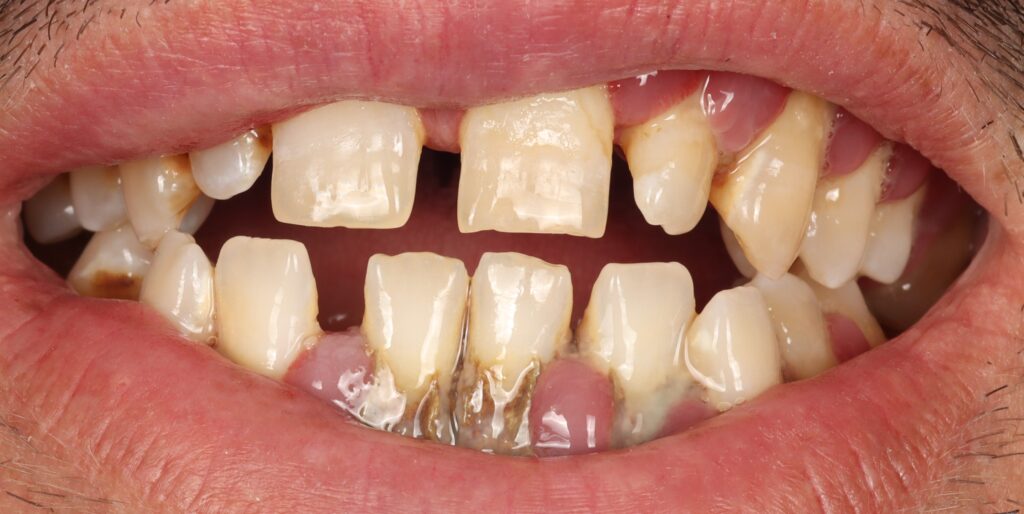Dental Implants and Gum Disease: What You Need to Know
Many people turn to dental implants to replace missing teeth, and one of the leading causes of tooth loss is gum disease. Gum disease is incredibly common and often goes unnoticed until it reaches a severe stage. Dental implants are increasingly popular because they offer a natural look and feel, making them one of the best options for replacing lost teeth. However, what’s not often discussed is the importance of treating gum disease before getting dental implants.
What is gum disease?
Gum disease is the inflammation and infection of the gums. The early symptoms include bleeding gums, red and inflamed gums, and pain. More severe symptoms include loose teeth, pus, abscesses, and a foul odor. In very severe cases, the infection causes the bone around the teeth to shrink away from the source of infection (known as bone loss). As a result, teeth become loose because there is less jawbone to hold them in place, leading to pain and the need for tooth removal.

We often see patients come to us with missing teeth due to gum disease who want to replace them with dental implants. We applaud these patients for wanting to take care of their teeth. However, some are not aware that they still have untreated gum disease.
Should You Get Dental Implants with Untreated Gum Disease?
The short answer is no.
Your mouth shares bacteria. Gum disease is caused by bacteria, and the bacteria that cause gum disease can also cause inflammation and infection around implants. Over time, you might lose the implant in the same way you lost your teeth before.
The good news is that if you have gum disease, it’s possible to get it under control. This allows you to enjoy not only the benefits of having teeth with dental implants but also to have healthy teeth in the long term.
How to treat gum disease?
There are several stages to treating gum disease:
Deep cleaning
This involves removing the hard buildup (calculus) and soft buildup (plaque) on your teeth. It also removes the disease-causing bacteria that harbor in the buildup and on the root surfaces. Sometimes, your roots or tooth surfaces are uneven, so your dentist or hygienist will smooth out the surfaces during the procedure to prevent easy buildup. After deep cleaning, it’s recommended that you follow a maintenance schedule based on your dentist’s recommendation. The most common frequency is every 3 to 4 months. Some patients need to be followed up every month until indicated otherwise.
Is deep cleaning alone enough?
We often see patients come to our office after deep cleaning and frequent maintenance, yet their gum disease still progresses. In some cases, deep cleaning alone is not enough. If the bone has already reduced, creating an irregular surface, your gum will follow the bone’s shape. When there’s a deep bone defect like a valley next to the root, cleaning instruments can’t reach the area, and you won’t be able to clean it either. In such cases, gum surgery is necessary to access the “valley” for cleaning and to even out the bone surface with grafting or by removing irregularities.
Home Care and Frequent Maintenance Cleanings
After your gums are stable and accessible for cleaning, it is important to maintain them with proper home care and regular professional maintenance cleanings. People who have had gum disease are more prone to it in the future.
Can My Implants Get Gum Disease?
Yes, your implants replace your whole tooth, including the root inside the bone and the crown part you see when you smile and use to chew. It’s a misconception to think that once you get dental implants, you don’t need to clean and take care of them like your natural teeth. Implants require the same care as your natural teeth. Otherwise, they can also develop gum disease, which can progress similarly to gum disease around teeth.
What If I Was Told My Gum Disease Is Too Severe, and All My Teeth Need to Be Removed?
In some cases, the gum disease is so severe, and bone loss is so significant that it can’t hold your teeth securely anymore. In such situations, your teeth may need to be removed, or they may eventually fall out, leading to even more bone loss. In that case, you have a few options: removable dentures or dental implants to regain teeth functionality.
Learn more about your options HERE.
Do you provide service to all the procedures that you listed above?
Yes, we strive to offer comprehensive dental care in one office, where patients can receive most of their treatment in one place to preserve and restore their dental health and enjoy having healthy teeth again.
